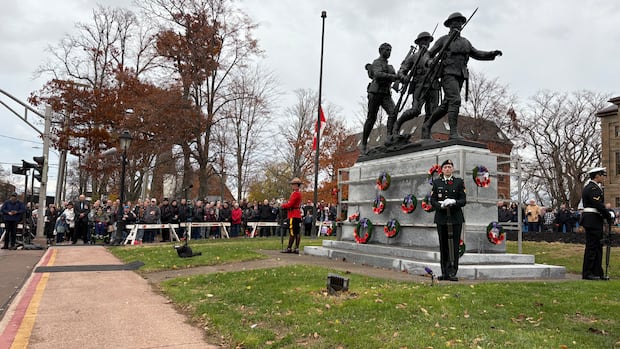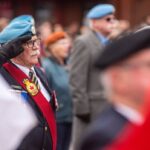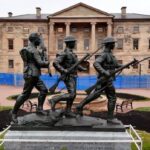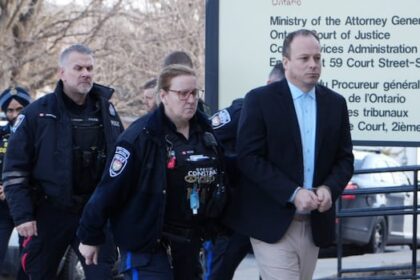PEI·UpdatedHundreds huddled together under grey skies at the cenotaph in Charlottetown to honour, remember and share the history of veterans during the annual Remembrance Day ceremony.‘As they answered the call to duty, it is our duty to remember them’Cody MacKay · CBC News · Posted: Nov 11, 2025 5:00 AM EST | Last Updated: 18 minutes agoListen to this articleEstimated 5 minutesThe audio version of this article is generated by text-to-speech, a technology based on artificial intelligence.The historical address this year focused on one Islander who worked on the family farm before packing up and serving in the First World War. (Ken Linton/CBC)Hundreds huddled together under grey skies at the cenotaph in Charlottetown, to honour, remember and share the history of veterans during the annual Remembrance Day ceremony.As is tradition, Maj. Rev. Tom Hamilton led the service at in P.E.I.’s capital city, surrounded by hundreds of Islanders in quiet reflection.At every annual gathering, Hamilton tells a story. From courage, sacrifice, love, faith and the wounds of war, each ceremony reflects on the lives of veterans who gave up something — if not everything. This year, Hamilton told Islanders about a young man who’d risked it all, and eventually came home to continue serving his province. His name was Private Ira Auld.From the North Shore to the Capture of MonsAuld was a farmer born in Covehead and later lived on the Winsloe Road, recruitment documents say. He answered the call to combat during the First World War.He enlisted out of Charlottetown at 22 years old, in the final year of the war. It was during a time when recruitment levels had “dried up,” Hamilton said. Hundreds made the ultimate sacrifice and should always be honoured and remembered.- Maj. Rev. Tom HamiltonVictory in Europe was not guaranteed. The outlook at that point in the war looked grim as the Germans pushed hard through western Europe.Canada needed Auld and others like him, said Hamilton, and so off he went.“Young Ira Auld was typical of most Island men at the time, growing up on the family farm,” Hamilton told the crowd in Charlottetown.“At the beginning of the war he was told to stay on the farm and work because food was vital to the war effort. But in January 1918 when he was told to enlist, there was no hesitation, and he became Private Ira Auld.”This image, from Library and Archives Canada’s photo archive, shows Canadians marching through the streets of Mons on the morning of Nov. 11, 1918. (Deptartment of National Defence/Library and Archives Canada/PA-003547)Not long into his training in England, Auld contracted measles and mumps, which held him in hospital for more than 40 days. He recovered, and was sent to France.Auld fought in the final push to win the war, known as the Hundred Days Offensive, or Last Hundred Days. He specifically fought in the Capture of Mons, where Canadians defeated the Germans in the Belgian city on the final day of the war, Nov. 11, 1918.“Church bells rang, people crowded into the streets,” Hamilton said, “and there was a celebratory parade.”‘We give thanks to all our veterans’Auld returned to P.E.I. after the war, married and began raising a family. He owned a country store in Harrington and worked as a carpenter, Hamilton said, before eventually settling in Charlottetown. WATCH | Historical address for the 2025 Remembrance Day ceremony in P.E.I.:Historical address for the 2025 Remembrance Day ceremony in P.E.I.The annual historical address highlights the stories of veterans, and this year Maj. Rev. Tom Hamilton told Islanders about Private Ira Auld. “Hundreds made the ultimate sacrifice and should always be honoured and remembered, but we also need to remember the service of individual soldiers like Private Ira Auld,” Hamilton said, “who faithfully served in uniform and then returned home, resolved to rebuild their lives and contribute to their communities despite their physical scars or the burden of the memories of their wartime service.”Hamilton concluded the service by asking Islanders to shake the hand of a veteran, call and thank them for their service or visit a cemetery and place a poppy on the grave of a veteran.He invited the crowd to visit the Charlottetown Legion and spend time with those who served.“On this Remembrance Day, we gather to honour the fallen; we show our respect for those who returned home to help make Canada a strong, peaceful nation; and we give thanks to all our veterans and current serving members for their service to Canada,” he said.“As they answered the call to duty, it is our duty to remember them. Lest we forget.”’It warms my heart,’ veteran saysJohanne Charest, a 20-year veteran who’s originally from New Brunswick and now lives in P.E.I., was one of those in the crowd at the cenotaph.Her grandfather served in the Second World War. This was her first time visiting the ceremony in Charlottetown.’In the time that we’re living now, it’s even more important, I would say, to think about what Canadians have done in the past,’ says Johanne Charest. (Ken Linton/CBC)Charest said sharing the stories of veterans these days is more important than ever before, especially for younger generations.”It warms my heart, to be honest with you, that people continue to come and take a moment to think about our veterans,” she said.”It means they’re telling the story. It means they’re sharing their experiences, they’re sharing what happened in our past.”Those stories, she said, need to be told. “In the time that we’re living now, it’s even more important, I would say, to think about what Canadians have done in the past,” Charest said, “and what Canadians continue to do and to remember the country that we live in.”ABOUT THE AUTHORCody MacKay is a writer, editor and producer for CBC News on Prince Edward Island. From Summerside, he’s a UPEI history and Carleton masters of journalism grad who joined CBC P.E.I. in 2017. You can reach him at cody.mackay@cbc.ca
From farms to front lines, Island veterans remembered for service at home and abroad











